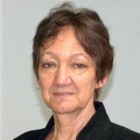Interactive Breakout Session OPN38
For Virtual Learners – The Value and the Price: Discussing Open Online Courses
Date Friday, Dec 2 Time – Room: Chess
Learners worldwide have the opportunity to access relevant course subjects. They are able to experience what tailored, personalised learning means and can gain knowledge and credits. But if open online learning can be equivalent or even superior to face-to-face education, what does this mean for the value and the price of MOOCs for institutions, for learning communities, for learners and for the creation of new knowledge?

Diana Laurillard
Professor of Learning with Digital Technologies, UCL Knowledge Lab, UK
Diana Laurillard is Professor of Learning with Digital Technologies at the London Knowledge Lab, UCL Institute of Education, leading research projects on developing the Learning Designer suite of tools and online community for teachers and trainers, on adaptive software interventions for learners with low numeracy and dyscalculia, and on the use of MOOCs for CPD.
Previous roles include: Head of the e-Learning Strategy Unit at the Department for Education and Skills; Pro-Vice-Chancellor for learning technologies and teaching at The Open University; the Visiting Committee on IT at Harvard University; Royal Society Working Group on Educational Neuroscience.
Most recent book is Teaching as a Design Science, 2012. Previous book, Rethinking University Teaching, Routledge, 2002, is one of the most widely cited in the field.
Links

Stephen Downes
Research Officer, National Research Council (NRC), Canada
Stephen Downes works for the National Research Council of Canada where he has served as a Senior Researcher, based in Moncton, New Brunswick, since 2001. Affiliated with the Learning and Collaborative Technologies Group, Institute for Information Technology, Downes specializes in the fields of online learning, new media, pedagogy and philosophy.
Downes is perhaps best known for his daily newsletter, OLDaily, which is distributed by web, email and RSS to thousands of subscribers around the world, and as the originator of the Massive Open Online Course (MOOC). He is a popular speaker, appearing at hundreds of events around the world over the last fifteen years. He has published hundreds of articles both online and in print through two decades of research and development into learning networks and related technologies.
Prior to joining the NRC, Downes worked for the University of Alberta as an information architect, and prior to that, as a distance education and new media design specialist for Assiniboine Community College in Brandon, Manitoba. This followed a decade of teaching experience both in person and by distance with Athabasca University, the University of Alberta, and Grande Prairie regional college.
At the University of Alberta he built a learning and research portal for the municipal sector in that province, Munimall, and another for the Engineering and Geology sector, PEGGAsus. He also pioneered the development of learning objects and was one of the first adopters and developers of RSS content syndication in education. Downes introduced the concept of e-learning 2.0 and with George Siemens developed and defined the concept of Connectivism, using the social network approach to deliver open online courses to three thousand participants over two years.
Downes obtained a BA and MA in philosophy from the University of Calgary, specializing in epistemology and the philosophy of science. He also studied at the PhD level at the University of Alberta, completing all but his dissertation. Among numerous volunteer and committee positions while a student, Downes served as editor of the Calgary student newspaper, the Gauntlet, for two terms, and as president of the Graduate Students' Association at the University of Alberta, also for two terms. He served as a member of the Board of Governors, University of Alberta, and with the Athabasca University Governing Council.
After completing high school at Ottawa's School of Continuing Education while working as a concession stand worker and dishwasher, Downes studied computing science for one year at Algonquin College while working as a telephone equipment installer and (later) as a security guard. He worked for a year as a computer operator for Texas Instruments in Calgary, then as a pot washer, 7-Eleven clerk, and development education programmer for the Arusha International Development Centre. Downes has also been a newspaper carrier, waiter at a race track, hot dog vendor, building cleaner and camp counsellor. He was a candidate for mayor in the city of Brandon in 1995.
Downes was born in Montreal, Quebec, in 1959 and has four brothers (all younger). He lives in Moncton, New Brunswick, with his wife Andrea (b. Colorado Springs, Colorado; married 1998) and four cats (Bart, Polly, Lexi and Alex).
Stephen reads a lot of science fiction and books in general. He enjoys movies, television and sports, especially hockey. He enjoys playing darts and NTN Trivia (though since Moncton has no NTN locations, it's a lot harder to play). He is an avid Civilization III player and an enthusiastic photographer.
Read more about Stephen Downes' views on the next era of learning.
Links
http://www.nrc-cnrc.gc.ca/http://www.downes.ca/

Nina Huntemann
Director of Academics and Research, edX, USA
Nina Huntemann is director of academics and research at edX. In this role, Nina is leading cross institution faculty initiatives, developing curriculum strategies and providing pedagogical expertise, managing educational policy projects, and facilitating research across edX university partners. Nina has over 15 years of college-level teaching, program administration, and faculty development experience. Prior to joining edX, she was an associate professor in the Department of Communication and Journalism at Suffolk University in Boston where she taught courses and published research in digital media studies. Nina received her Ph.D. in communication at the University of Massachusetts Amherst.
Links

Konstantin Scheller
Policy Officer – Innovation in education: Digital Technologies, OER, Copyright, European Commission, Belgium
I work as a Policy Officer for Innovation in Education at the European Commission's Directorate General for Education and Culture (DG EAC). My specific focus is on the digital transformation of education, regarding both the use of digital devices as well as concerns around the provision of digital skills and competences in the population.
Links
http://ec.europa.eu/index_en.htm
Moderator

Brian Mulligan
Programme Manager (Development), Centre for Online Learning, Institute of Technology Sligo, Ireland
Brian Mulligan is a Civil Engineer who originally worked in mathematical modelling and simulation and the application of information technology in engineering. He is currently on secondment as a Programme Manager responsible for online learning development in the Centre for Online Learning at the Institute of Technology Sligo where he has lectured since 1984. He has been the key driver in the rapid growth in online learning in IT Sligo since 2002 and significantly involved in the growth of e-learning in Ireland since 1999, organising the EdTech series of conferences since 2000 and as a founding member of the Irish Learning Technology Association in 2002. His main areas of expertise are now in web-casting, webinar management, synchronous online training, instructor-led online training, lecture capture, open education (MOOCs and OER) and the rapid development of online content. He currently is the leader of the Erasmus+ funded LoCoMoTion project on low-cost MOOC development.
Links
http://www.itsligo.iehttp://brian.mulligan.googlepages.com